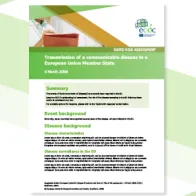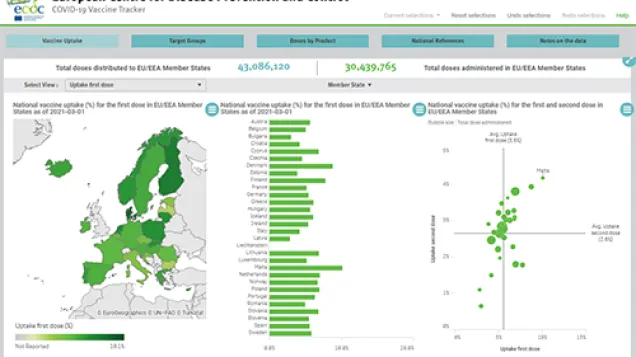High risk of autumn surge in COVID-19 cases and deaths in countries with insufficient vaccination coverage, warns ECDC
The risk of experiencing a significant surge in cases, hospitalisations and mortality for the upcoming two months remains due to very high virus circulation, and fully vaccinated vulnerable individuals are still at risk of experiencing infection with severe outcomes.
So far, only 61% of the total population in the EU/EEA have been fully vaccinated*, and only three countries (Malta, Portugal, Iceland) have vaccinated more than 75% of their total population. There is considerable variation in vaccine uptake across countries and within regions, resulting in large proportions of the EU/EEA population remaining susceptible to infection.
"Forecasts show that a combination of high vaccination coverage and effective contact reduction is crucial for reducing the risk of high COVID-19 burden on the health care systems this autumn,” says Andrea Ammon, ECDC Director. “Countries should continuously strive to increase their vaccination coverage in all eligible age groups, regardless of current vaccination coverage levels, to limit the burden of infections posed by the Delta variant. Depending on the local epidemiological situation, non-pharmaceutical interventions may also still be needed until the end of November.”
Countries with higher COVID-19 vaccination coverage in the total population are at a lower risk of experiencing a severe surge of cases, hospitalisations and mortality from now until the end of November unless there is a rapid decline of vaccine effectiveness due to waning immunity.
The report also anticipates that greater proportions of SARS-CoV-2 cases amongst children will be reported in the coming months. Interventions such as physical distancing that prevent crowding as well as hygiene and improved ventilation will remain essential to prevent transmission in school settings.
Vaccination against seasonal influenza, particularly for vulnerable populations and healthcare workers, will be essential to mitigate the impact on individuals and on healthcare systems in the coming months from the potential co-circulation of the two viruses.
It remains crucial that COVID-19 surveillance systems can effectively monitor and report on COVID-19 cases, hospitalisations and deaths, in order to guide decisions on public health measures and to understand their impact.
*Total population’ includes all citizens, including younger age groups for whom the vaccine is not available, or who may not be included in national target groups yet.





